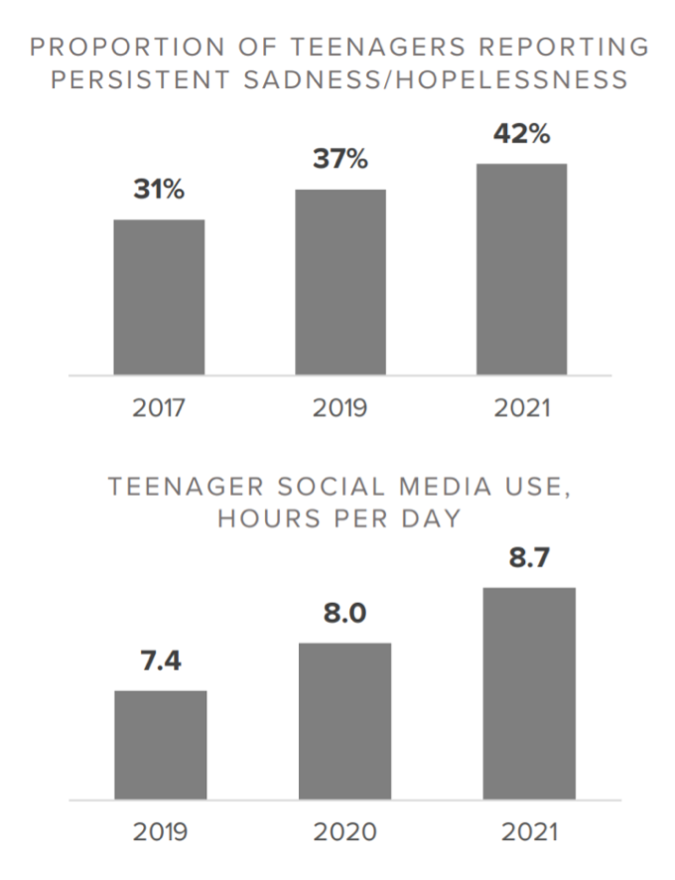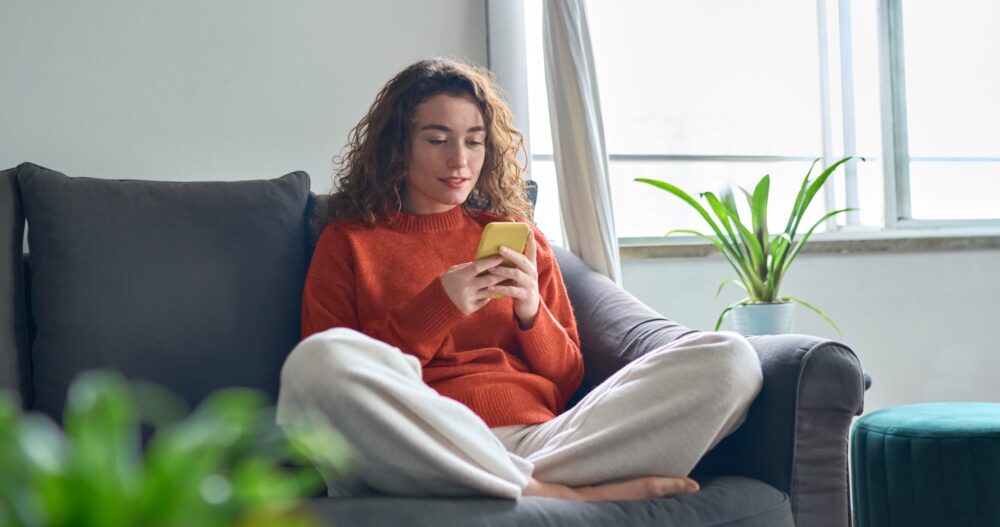Let’s be real: social media can feel like a double-edged sword. On one hand, it’s a fantastic way to stay connected with friends, discover new communities, and share life’s big and small moments. But on the flip side, it’s easy to feel like you’re missing out, not good enough, or just plain lonely. So, is social media making us more connected or more isolated? Let’s dive into the good, the bad, and the downright confusing aspects of our digital lives.
Is it Bad to Use Social Media for Connection?
Using social media too much can amplify anxiety and depression, and even make us feel lonelier and more disconnected. It can intensify our sense of isolation and separateness from others by tricking our minds into comparing ourselves to the idealized personas of our online “friends” in so many ways.
We all know that it’s bad for us to spend too much time on “social” platforms, and in-person, face-to-face communication is categorically better and vital for our well-being—a literal necessity.
BUT let’s not forget that there are ways social media is HELPING us connect too. It can help us keep in touch with high school friends, wish an old coworker happy birthday, or share photos of big life milestones. These small acts to can make us feel connected even when geographically we’re not near.
Social Media and Mental Health
Let’s be clear—to say that social media is all “bad” for our mental health is an oversimplification. The term “social media” describes a variety of platforms, and some are more concerning than others. It also depends on your settings, who you’re friends with, what content you’re viewing, and how much time you spend on it.
When used appropriately, it can be a powerful tool for connecting us to people we may otherwise not be able to engage with, and it can help us to communicate ideas and express ourselves and our beliefs to others in a way that we otherwise wouldn’t be able to do. Like most tools, it really depends on how we use it. A hammer can be used to build a house, or to break china. Social media’s not inherently good or bad. But if not used intentionally, it can really do a number on us.
Our nervous systems are designed to avoid threats to our safety. They work really well—sometimes too well. We weren’t built to respond to global pandemic or a 24-hour news cycle of bad news. Our nervous systems are meant to respond to immediate threats (in the moment), not ongoing, prolonged and abstract ones. Sometimes our nervous systems can get tricked into staying in the “on” position, leading to prolonged adrenaline and stress hormone releases. This causes serious anxiety, fatigue, hopelessness, sleep problems, and a host of other issues.
Noticing some of these issues in yourself? Maybe it’s time to talk to a therapist about it.
In an ideal world, stress is a helpful thing that gets us out of harm’s way, and then as soon as we’re safe, it shuts off. When you’re dealing with anxiety, we might be safe, but the nervous system still thinks there’s a threat!
Yes, that means that seeing too many social media posts about stressful things can make our brain think we’re in danger, even if we’re not actually in any danger. Additionally, seeing people engage in unproductive conflict and name calling online can make us feel helpless, sometimes hopeless.
Studies show that too much social media use is linked to reduced work performance, social problems, sleep issues, decreased life satisfaction, and feelings like jealousy, anxiety, and depression.
Using Social Media Mindfully
As we’ve noted, social media isn’t all bad (despite what your grandparents tell you). Here’s the “it depends” part—if you stay on the right side of it and use it mindfully, it can be a helpful tool.
As a therapist, I was talking to a client recently who was sharing about the love-hate relationship she has with an Instagram account she follows. She felt inspired by how much this influencer travels, what she cooks, and the time she spends working out and on the beach. However, my client also talked about how this account also often leaves her feeling bad about her own habits and even her appearance. We discussed the pros and cons social media use, and we broke it down in the following ways:
- First and foremost, use social media to stay in touch with people who make you feel good. Exchanging direct messages with friends and loved ones who give you good vibes is a good thing. It’s fun to see what your friends are up to—who’s having kids, who got a new promotion, and who’s moving back to their hometown.
- Second, reading uplifting things can inspire your own life. Social media connects us with new ideas and new people, and it can give our brains that boost of oxytocin in that way.
- Third, using social media to find resources, advice, knowledge, and connection is great! (It just requires a tremendous amount of awareness, intention, and strategy to do so—for every way that exists to do it right, there’s about 100 ways to end up in the ditch.)
- Fourth, being mindful before you post is going to go a long way. Whether it’s a response to someone else, or a new statement you want to make to the world, take a moment before you hit the blue button to check in with yourself, and ask, “Why am I really posting this?” And be honest. If it’s because you feel inspired to share part of yourself with your community, go for it. If it’s coming from a place of “keeping up with the Joneses,” perhaps take a pause or reevaluate.

Social media often serves as a passive distraction. Instead, try engaging in activities that are more active and meaningful, such as playing a card game, reading, practicing mindfulness, or creating art. The NY Times puzzle app has been a good alternative for me. When I’m bored or feeling anxious, I often pull out social media or a news app out of habit, but I have found the New York Times puzzles are a great distraction and alternative. Keep in mind that replacing instead of taking away is usually a easier to do.
Pro tip: The “One Sec” phone app is a cool tool that I’ve discovered recently and recommended to some of my clients. It requires you to take a deep breath before opening any social media apps.
Is YouTube Considered Social Media?
The answer to this question might depend on what you actually use this website for.
YouTube is the most popular video-sharing app, with more than a billion users, nearly 33% of Internet users total. For some, watching YouTube videos is solely for learning how to fix a leaky pipe under your sink or listening to your favorite podcast about mental health (shameless plug for our therapy podcast).
For many others, it’s a place where people connect, share, and engage with content just like Facebook, Instagram, or TikTok. It’s all too easy to get sucked into a “YouTube hole” where lots of time has passed before you realize it. For that reason, it’s important to be mindful of your time spent on YouTube.
Is WhatsApp Considered Social Media?
WhatsApp is a popular messaging app, where users can send texts, photos, and videos over the internet. It’s most popular outside of the US or when users want to be able to share messages using internet data instead of cell phone service. By definition, WhatsApp is technically social media (it’s allowing you to be social with others), although it doesn’t have the same features as other social networks where content creation is king.
If you were my client, I would ask:
- What’s your purpose is in using the app?
- Is it helpful for connecting to loved ones or is it getting in the way of your connections?
- How does it makes you feel while you’re on it? (Isolated, jealous, anxious, happy, etc.)
Depending on your answers to these questions, we may discuss setting boundaries with its use, changing who you’re connected to on there, or even adjusting how you are using the platform if necessary.
How to Break Social Media Addiction
Hey, I get it—scrolling endlessly can feel like second nature, but it’s time to take control. Research shows that excessive use of social media can lead to negative effects like decreased productivity, unhealthy social connections, and over all lower life satisfaction. Need to break that addiction? Here are some tips I recommend:
- Set Boundaries: Limit your screen time with app timers. It’s like giving yourself a curfew.
- Find Alternatives: Swap your phone for a book or a hobby. Rediscover what you love offline. When trying to beat an addiction, it can be helpful to keep a substitute within reach.
- Digital Detox: Try a weekend without social media. It might be really hard, but you’ll be surprised at how refreshing it is. If you notice yourself mindlessly clicking that little blue square, un-downloading the apps or logging out can add the extra step to disrupt that habit.
- Mindful Usage: Be conscious of why you’re logging in. Especially the stressful stuff—only take in what you need to be well, and then give it a rest. Is it boredom or genuine interest that’s bringing you in?
- Connect IRL: Hang out with friends face-to-face. Real-life connections are crucial for your mental health!
Remember, it’s all about balance. You’ve got this!
Get Support From an Online Therapist
Being a person can be hard sometimes. The most important thing is that you take care of yourself, and understand that your struggles do matter—and that there’s help available to you. We all need support sometimes.
The good news is that mental health services are available, and some traditional barriers to access are no longer a problem (ie. travel distance, location, etc.). Online therapy (also called “telehealth therapy”) is now widely available and easily accessed by a smart phone or computer.
At Ellie Mental Health, our providers are available to connect online or in person, and services are covered by almost all the insurance carriers. If you’re feeling isolated, depressed, or just plain stressed, you’re not alone. Seek support today or give us a call if you have any questions.
Get matched with a therapist near you today at Ellie Mental Health.


